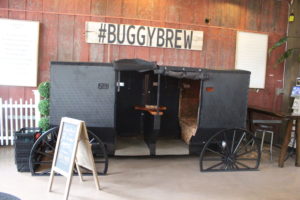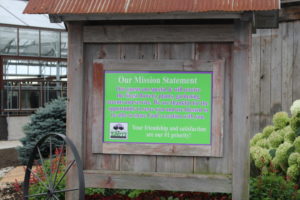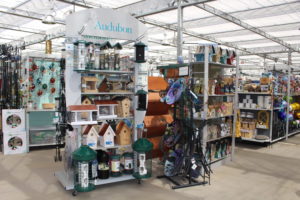Laying Roots
In many communities, garden centers play a vital role in enhancing the quality of life for local residents. They bring nature, beauty and a sense of tranquility. As such, garden centers often dig deep roots into their communities, becoming fragrant, faithful fixtures. Some businesses take it a step further by putting their unique role to work for a good cause and profit. Community-minded, savvy business owners recognize the “win-win” potential of investing in the community, either by organizing community service events that meet the needs of the particular area or partnering with other organizations that are already tackling these needs, in turn earning the loyalty and esteem of their neighbors.
Lisa Aquizap, community outreach director for Churchill’s Gardens in Exeter, N.H., says the 50-year-old garden center’s dedication to giving back to the town stems from a connection to the people they serve. “It’s about being part of the community, not just as a retailer but as a citizen. The same issues that the community has, we have. It’s just that one-ness component. We’re your neighbors.”
“We’re Part of their Memories”
Churchill’s Gardens has made community service a priority, infusing time, resources and passion into their efforts. An example of their community outreach includes a monthly “green thumbs” club for children, through which kids ages 2 to 11 visit the garden center for a range of educational and fun programs on the environment. The garden center also maintains a petting zoo for kids to enjoy free of charge. These programs bring kids to the garden center at a young age, instilling in them fond memories of your business and raising the odds that they might shop in your center when they get older.
Churchill’s Gardens also contributes to groups such as the Seacoast Hospice and a low-income housing partnership in New Hampshire with services including free landscaping and plantings. In addition, the garden center donates money to the Exeter Children’s Fund and participates in community celebrations such as the “Old Home Days” festivals popular in the region. This level of involvement with the community, Aquizap says, has yielded countless benefits, both tangible and intangible: “We’ve become part of their families’ past. I just feel like we’re part of their memories. I think it roots you into a community in a way that you wouldn’t be otherwise,” she says. “It’s a loyalty issue. People see that we’ve invested in the community, and they invest in us.”
“A Natural Extension”
Beth Zwinak, manager of Tagawa Gardens in Centennial, Colo., shares Aquizap’s vision of garden centers giving back to the communities that keep their businesses thriving. Tagawa Gardens’ mission is, first and foremost, to provide their community with an enjoyable experience, she says. Then they worry about moving product. “People come to us to make their environment beautiful. For us, [a community service program] was a natural extension of this.”
In its 26-year history with the community, Tagawa Gardens has cultivated ties with their neighbors and gained a reputation as a business that truly cares. When the business first started really focusing on philanthropic events, some people wondered why they were putting so much effort into something that didn’t appear to directly impact their bottom line, she says. But for Tagawa Gardens, the benefits are “far-reaching, long-lasting and very rewarding,” she says. “We intend to be here for a long time. We want next generations to think of us. It’s a really cool way to be in people’s lives, to be important to their families and their activities.”
Tagawa Gardens’ list of community outreach programs is impressive. They donate about five percent of their profits to nonprofit, nonreligious and charitable groups in the form of plant/garden supply and gift cards. They’ve also contributed to wildlife gardens for the community, school garden projects and healing gardens at hospitals.
Over time, some events evolved into community staples, such as their annual pumpkin fest food drive and their “Grey Kitty” pet adoption program, named after the garden center’s mascot, in which more than 15 animal rescue groups participated last year. “These events generate good will and a warm fuzzy [feeling] and are a great way to give back to our community, which supports us,” Zwinak says.
“A Win-Win”
As much as Aquizap believes in the causes that Churchill’s Gardens backs with its programs and donations, she also recognizes the benefits this commitment might yield for the center’s long-term revenue. Owners need to change their mindset, she says, and recognize community outreach as “another facet of marketing.”
“Goodness knows, you’re always looking for a new and innovative way to market your business,” Aquizap says. “How many newspapers ads can you run? I consider this an innovative marketing strategy. And it’s a win-win that’s the cool part.”
You might even draw new people to your door. Through community outreach events, you can attract people who support a particular cause but who may never have set foot into a garden center before. “A lot of people think, ‘I’m not a gardener, why would I go to a garden center?'” says Beth Zwinak of Tagawa. Once they’re in, you can help them see all your other merchandise. “It’s great exposure for us to people that may never have discovered us,” she says.
“Being Different”
Not sold yet? Investing in the community also has another strong appeal for independent retailers: It can give you an edge over your big box competitors. “It’s a tough world to survive in and compete with box stores,” says Lisa Aquizap. “We have to look different, but in order to look different, we actually have to be different. We have to be a good neighbor, a good citizen.”
Nancy Anderson, special events coordinator with the Seacoast Hospice, a next-door neighbor of Churchill’s Gardens, says the staff and patients have benefited tremendously from the garden center’s generosity. Besides enhancing the physical beauty of the hospice through surprise donations of wreaths and helping weed the grounds, they partnered with Timberland Corporation to landscape a “reflection/Zen” garden, creating a soothing oasis for the patients, family and staff wrestling with a difficult situation. “Because the work so many people do here is so intense and so heartfelt and emotional, to be able to come and see something beautiful as you come into the door, to have a labyrinth for people to go and relax and enjoy nature; contributing to that kind of peace for people is really important,” Anderson says.
Their garden centers, Aquizap and Zwinak say, are not just viewed as retail places by the community. They are a familiar gathering place and a constant presence in the lives of many of the residents.
“If a box store moved out of town, people aren’t injured. I think if Churchill ever had to close, the community would lose a lot in different ways,” Aquizap says. “That makes people want to help the business survive.”
“One of Those Priceless Things”
As business owners battling a tough economy, you have an obligation to keep a careful eye on your bottom line: Remaining profitable is a must. But as members of the community, you can also play a unique role in beautifying the area you serve. If you plan to be around for a while, it’s a smart move to lay some roots and cultivate your business’ image so that you’re not just seen as a retail store but also as part of the community, a neighbor that others want to see stick around. After all, a caring, close-knit and vibrant community is good for business! As Beth Zwinak of Tagawa Gardens knows, people support you because you support the community. “At first, it was to expose our business to potential new customers. However, it has become so much more to us,” she says. “The benefit of our community effort is hard to measure. It’s one of those priceless things.”
SIDEBAR
Pointers from the Pros
Whether you are a sprawling garden center with plenty of resources and space, or a smaller business, you can still play an important role in benefiting the community. Investing in your community can help you reap the long-term benefits of neighbors who have a personal stake in helping you succeed.
Beth Zwinak, of Tagawa Gardens, has the following advice:
Start small. If you’re venturing into new grounds with community outreach, don’t try to do too much too soon. Brainstorm some smaller ideas that you can execute with limited staff, resources and time to test the waters and see how the community reacts.
Put your heart in it. It’s important that you and your staff choose a group or cause that you truly believe in. This will give you the extra motivation and energy necessary to make the event a success.
Be committed. If your first efforts flop, don’t despair. Treat it as a learning experience, consider what went wrong and try to fix those mistakes in your next program.
Budget for your success. Although you don’t have invest a huge sum of money into these events; it’s likely that you will have to bear some expenses. Make sure to plan accordingly, and ensure that you have the proper staff to help you see it through.
Designate a leader or leaders. Putting one person in charge or creating a committee will help make the brainstorming, planning and execution phases much more efficient and effective.
Publicize. Don’t forget to get the word out about your program! If you’re partnering with another organization, tap into their list of contacts and advertise through different venues (as your budget allows) to target a diverse group of people. This can range from word of mouth to inexpensive flyers to give out at your store, or you can stick to the more traditional radio and newspaper ads. In time, your community outreach will serve as its own publicity mechanism, letting people know about your business and contributions to the community!
Lisa Aquizap, of Churchill’s Gardens, adds some more tips:
Keep your ears to the ground. Before you dive into planning a community outreach program, event or sponsorship, pay close attention to tap into the particular needs of your community. “Sometimes there’s a need that people aren’t soliciting,” Aquizap says. “How we find out about it is quite often just talking with the community. Because we’re part of the community, our ears are to the ground. We’re listening.”
Partner with other groups. You don’t have to do it alone. Many organizations, corporate and nonprofit, are actively seeking businesses to partner with in support of certain causes. Nonprofits can provide you with a worthy cause, and corporate partners can give you the added revenue or resources you might need to make it happen.
Target youth. By bringing kids to your garden center at a young age, they will begin to associate your business with a familiar, happy place. In fact, “kids have us as a destination,” Aquizap says. Not only can these kids grow up to be more civic-minded, but they can also be more likely to frequent garden centers as adults. And when parents see you having a positive impact on their children, they might feel inclined to help you out, too.


















 Videos
Videos





